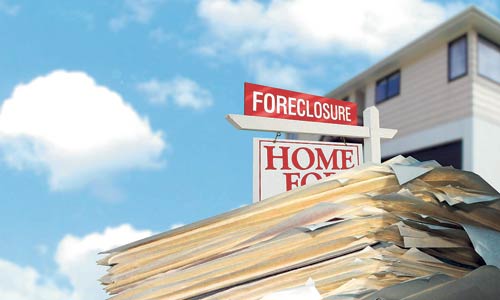When state lawmakers put strong new consumer protections in Hawaii’s out-of-court foreclosure law last year, foreclosures fell sharply as lenders avoided the new rules and funneled a restrained volume of cases into the courts.
Now the number of foreclosure cases going through the courts could slow further or stop altogther because of another change the Legislature passed last month.
Attorneys representing mortgage lenders predict that part of House Bill 1875, which further overhauls the state’s foreclosure law, will dramatically reduce or even halt home foreclosures statewide.
"The bill is likely to stop all judicial foreclosures," said David Rosen, a foreclosure attorney.

Steven Guttman, chairman of the Hawaii State Bar Association’s Collection Law Section, also anticipates that what remains of foreclosures in Hawaii will dry up, at least in the short run.
Broadly, HB 1875 aims to improve the out-of-court foreclosure process shunned by lenders last year.
But a small piece of the bill — fewer than three of its 183 pages — requires that attorneys who file foreclosures in court on behalf of lenders research and affirm the accuracy of all case documents.
The requirement applies to all new and pending foreclosure cases in Hawaii courts and would last until July 1, 2017.
Gov. Neil Abercrombie is expected to sign the bill into law.
Attorney affirmations are intended to help ensure that foreclosure cases don’t contain bad practices such as improper documentation of loan assignments and robo-signing, a scheme some mortgage processors used to falsely certify that documents had been reviewed.
"All we’re saying is make sure you have the legal authority to foreclose," said Rep. Bob Herkes, chairman of the House Consumer Protection and Commerce Committee. "What’s wrong with that? I think Hawaii homeowners deserve that considering what they’ve been through. Before Act 48 (the foreclosure reform law passed last year), someone could foreclose on a home in one month without the homeowner knowing about it."
Herkes said the only tactic the attorney affirmation requirement should stop is the filing of improper foreclosure cases. So if cases dry up, he will take it to mean that lenders had problems with their legal authority to repossess homes.
The attorney affirmation is modeled on one imposed in New York state in 2010. Similar rules also were implemented in two large Ohio counties at about the same time.
The provision requires attorneys handling foreclosures to communicate with a representative of the mortgage’s owner who has reviewed all documents and confirmed their factual accuracy.
Furthermore, the affirmation requires that attorneys inspect foreclosure documents and make "other reasonable inquiry" to affirm the documents contain no false information "to the best of their knowledge." Attorneys must attest to this in a written affidavit under penalty of purgery.
Rosen said it would be extremely difficult, if not impossible, for an attorney to verify all these things.
Rosen and other lawyers also believe that putting the responsibility on them to verify the accuracy of foreclosure documents initiated by financial institutions unfairly and unacceptably opens them to liabilities including court penalties and an opportunity to be sued.
"While it might seem as if the bringing of such a false claim against an innocent verifier would be uncommon, it is going to happen," the Bar Association’s Collection Law Section said in written testimony on the bill. "Desperate borrowers, especially (ones without legal counsel) who are attempting to delay the loss of their home and who may be fueled by misleading advice from the Internet and other questionable sources, already are bringing such claims because they have nothing to lose."
The Bar Association as a whole raised concerns about the affirmation at the Legislature, saying it forces attorneys to reveal information relating to their representation, which compromises the attorney-client privilege.
Herkes rejects this argument, saying the affirmation doesn’t require attorneys to reveal any protected information. He suggests that attorneys shouldn’t be blindly handling what he said are "countless fraudulent (foreclosure) claims" being run through Hawaii courts.
Sen. Rosalyn Baker, chairwoman of the Senate Commerce and Consumer Protection Committee, said the process of repossessing someone’s home needs to be fair and have integrity. "There’s abundant evidence to the opposite," she said.
The Bar Association’s Collection Law Section contends that no evidence exists that flawed judicial foreclosure complaints have been or are being filed in Hawaii.
The Hawaii Judiciary hasn’t tracked the issue, and can’t say whether it’s a problem, according to Mark Santoki, a Judiciary spokesman.
In New York, judges publicly complained about problematic foreclosure cases creating a logjam in the courts there, which led the court system to impose attorney affirmations.
Supporters of attorney affirmations in Hawaii cite a county-commissioned review of 382 foreclosure sales in San Francisco completed between 2009 and October 2011. The report published in February concluded that 84 percent of the cases had legal flaws, and 99 percent had irregularities.
The bulk of the issues, representing 75 percent of cases, had to do with whether the power to foreclose was properly transferred among owners and agents of the mortgage debt. In 6 percent of the cases, those foreclosing failed to file an affidavit attesting that a borrower was properly informed of default.
The report said a major factor in flawed cases stems from California foreclosure laws having been written before it was common for lenders to sell mortgages to other financial institutions or package them as securities sold to investors. Still, the report concluded that "with so many homes being foreclosed and with so little oversight, California’s foreclosure process appears utterly broken."
Some observers say the report suggests that foreclosure improprieties are pervasive nationwide.
George Zweibel, a Hawaii island attorney representing borrowers, encouraged lawmakers to impose the attorney affirmation in part because the San Francisco study "strongly suggests" that the magnitude of problem foreclosures in Hawaii is much greater than previously realized.
Hawaiian Community Assets, a nonprofit homeownership support organization, testified that attorney affirmations will guard against "unchecked fraudulent behavior, which unfortunately led to the wrongful foreclosure of Hawaii families’ homes."
If attorney affirmations are implemented, it still may be hard to tell whether or to what extent flawed foreclosure cases exist in Hawaii.
In New York, where the state bar association welcomed the requirement, foreclosures fell by 80 percent shortly after the rule was implemented. Some observers said attorneys were fearful of attesting to document accuracy. Others said lenders and attorneys needed time to work out a new process. But it’s also possible that lenders withheld problematic cases.
In Hawaii, Act 48 has already led to a 60 percent drop in foreclosures. After Act 48 was adopted in May 2011, foreclosures fell to about 400 a month from about 1,000. The attorney affirmation rule, if adopted, could reduce the number of Hawaii foreclosures even further.
In Ohio, attorneys challenged the affirmation rule but failed to get it rejected. Foreclosure cases in the counties with the rule, which include Cleveland and Columbus, declined 10 percent to 20 percent last year, though that was less of a decline than in many other Ohio counties.
Unlike Hawaii, all foreclosures in New York and Ohio must go through court.
Herkes speculates that lenders and attorneys who oppose Hawaii’s new attorney affirmation rule, if it becomes law, might return to filing cases out of court in the overhauled nonjudicial process that allows for mediation and requires no attorney affirmation. However, owner-occupant homeowners would have the right to convert nonjudicial cases into court cases subject to the attorney affirmation rule.





